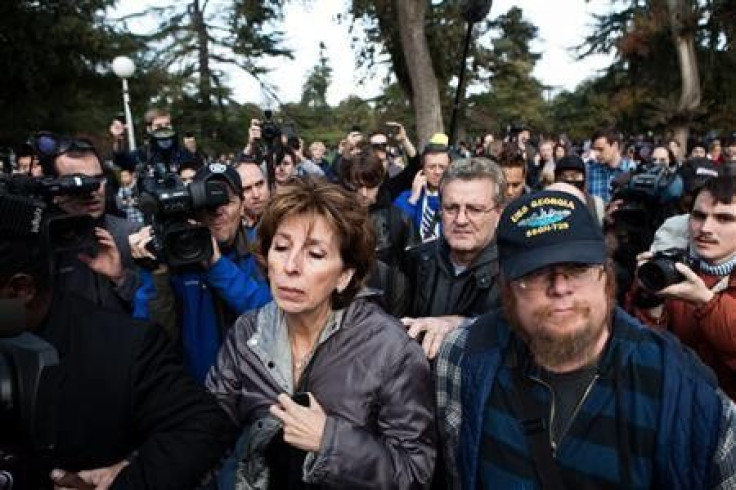UC Davis Chancellor Sorry for Pepper Spray Incident

A University of California chancellor apologized to jeering students on Monday for police use of pepper spray against campus protesters in a standoff captured by video and widely replayed on television and the Internet.
The pepper-spraying last week led to suspensions of the campus police chief and two officers, and thrust the normally quiet, conservative and mostly apolitical UC Davis campus to the forefront of anti-Wall Street Occupy protests nationwide.
Faculty and student critics of Friday's confrontation, some of whom demanded the chancellor's resignation, said it had damaged the school's image and the climate for free expression at the university.
UC Davis Chancellor Linda Katehi has come under sharp criticism for the school's handling of the protests, with some critics blaming her for what they viewed as excessive force employed by campus police.
An hours-long rally on Monday, attended by more than 1,000 students, faculty members and even parents, was capped by demonstrators pitching at least a dozen tents in the center of the campus, again defying rules forbidding such encampments.
Taking the stage following a parade of speakers who railed against her, Katehi told the crowd: I'm here to apologize. I really feel horrible for what happened on Friday. Many in the audience answered with boos and catcalls.
You may not believe anything I say today. It's my responsibility to earn your trust, she said, adding, I don't want to be the chancellor of the university we had on Friday.
The crowd roared back with cries of Resign!
She left the stage after about a minute, looking shaken, and was hustled by security personnel to a waiting car, followed by a throng of media and a cluster of students yelling: Don't come back!
As on other campuses around the country, protests at UC Davis, a school of 31,000 students known for its agriculture, wine-making and veterinary programs, started out focused on issues of economic inequality and tuition hikes.
But Monday's rally was spurred by last week's pepper-spray dousing of protesting students and an earlier confrontation at UC Berkeley in which police jabbed students with night sticks.
There was no visible police presence at Monday's gathering, which remained peaceful.
Before, students didn't see how (the Occupy movement) affected them, but I think watching the video ... they see how it affects them, said Cole Sawyer, 19, from Long Beach, California, one of the students pepper-sprayed last week.
HOT SPOT
Hours earlier in Oakland, a hot spot of anti-Wall Street activism in recent weeks, police in the largely working-class city on the east bank of San Francisco Bay swept away, at least temporarily, the last of the town's protest camps.
Police moved in shortly after midnight and removed 20 to 30 tents from Snow Park, the only Oakland camp still standing after another park and a vacant lot were cleared on Sunday. Later, organizers said they had occupied a home in the process of foreclosure in what they described as a home defense.
Oakland police spokeswoman Johnna Watson said the tents at Snow Park were dismantled without incident or arrests.
Oakland has been a flash point of the anti-Wall Street movement, helping rally support nationwide for demonstrations launched in New York in September to protest excesses of the financial system, bank bailouts and high unemployment.
Attention over the weekend shifted to UC Davis, near the state capital, Sacramento, where a widely circulated video clip showed a police officer walking back and forth in front of protesters huddled on the ground, repeatedly spraying them in the face. Other police kept onlookers at bay with batons.
UC President Mark Yudof placed two campus police officers on paid administrative leave on Sunday and launched a review of police procedures university-wide. He told all 10 UC campus chancellors in a teleconference on Monday: We cannot let this happen again, according to a university statement.
Katehi said on Monday that the campus chief of police had also been suspended. In addition, she asked the Yolo County District Attorney's office to investigate the use of force by campus police and said she would create a task force to conduct a campus review and report recommendations in 30 days.
But the executive council of the Academic Senate at UC Davis, which represents some 1,800 faculty at the campus, voted on Sunday to form its own inquiry and a representative assembly of all 100 department representatives next week.
The agenda will be to have a discussion with the chancellor, council chair Linda Bisson, a viticulture professor, told Reuters. She added that one possible outcome could be a call for a vote of no-confidence.
Most people I've spoken to say, 'We want the facts in the case, and then we'll decide.' Others say, 'It doesn't matter what the facts are. The incident was so atrocious, the chancellor has to go.' No date for the meeting has been set.
UC Davis spokeswoman Claudia Morain denied that Katehi had instructed police to use force in removing tents last week.
There was a concern that letting them remain and letting the number grow could be a health hazard. The whole idea was to end it peaceably, she said.
© Copyright Thomson Reuters 2024. All rights reserved.











